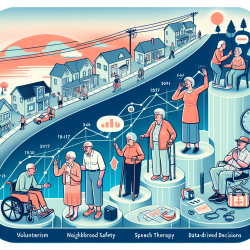As Special Education Directors, we are always on the lookout for innovative approaches to support our students. A recent study titled Protocol for a randomised controlled feasibility trial of parent-delivered early language intervention for children with Down syndrome (PACT-DS) has shed light on an exciting new method that can be a game-changer for children with Down syndrome. This study emphasizes the power of parent-delivered early language interventions, which can have a significant impact on children's language and literacy development.
Why Early Language Intervention Matters
Down syndrome is the most common genetic cause of intellectual disability, affecting 700–800 babies annually in the UK. Language development is a critical area of concern for children with Down syndrome, as it impacts social opportunities, learning, cognitive development, mental health, and overall independence. The PACT-DS study addresses these concerns by focusing on early intervention during a period of rapid brain growth and heightened neuroplasticity.
Understanding the PACT-DS Program
The PACT-DS (Parents and Children Together for Down Syndrome) program is a parent-delivered early language teaching initiative. The study involved a feasibility randomised controlled trial (RCT) with 28-30 children aged 3-6 years with Down syndrome. Parents were trained to deliver daily 20-minute sessions, five days a week, over a 30-week period. The program includes:
- Reading Together: Parents and children read storybooks and discuss the story.
- Words: New words are taught using games, activities, and picture resources.
- Using Words: Structured activities and visual resources help children create sentences and understand story structure.
Key Findings and Implications for Practitioners
The study revealed several promising outcomes that can help practitioners improve their skills and encourage further research:
- Significant Language Gains: Children showed improvements in expressive vocabulary, grammar, and narrative skills.
- Parental Involvement: The program's success underscores the importance of empowering parents as active participants in their child's education.
- Cost-Effectiveness: Parent-delivered interventions are more cost-effective compared to practitioner-delivered programs, especially in times of limited resources.
How to Implement PACT-DS in Your School
Here are steps to get started with PACT-DS in your school:
- Train Parents: Organize training sessions to equip parents with the necessary skills and resources.
- Provide Support: Offer ongoing support through regular check-ins, home visits, and online resources.
- Monitor Progress: Use assessments and qualitative surveys to track children's progress and make necessary adjustments.
Encouraging Further Research
The PACT-DS study highlights the need for more high-quality research in early language interventions for children with Down syndrome. Practitioners are encouraged to explore additional studies and share their findings with the broader educational community.
To read the original research paper, please follow this link: Protocol for a randomised controlled feasibility trial of parent-delivered early language intervention for children with Down syndrome (PACT-DS).










